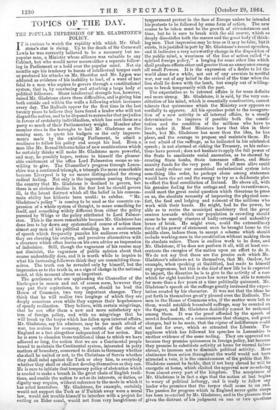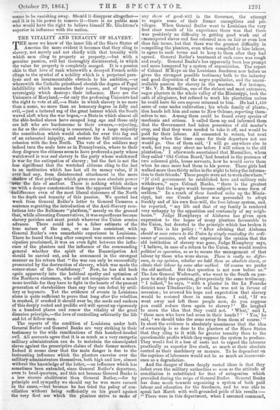TOPICS OF THE DAY.
THE POPULAR IMPRESSION OF MR. GLADSTONE'S POLICY.
IT is curious to watch. the rapidity with which Mr. Glad- ]. stone's star is rising. Up to the death of Sir Cornewall Lewis he was currently believed to be a necessary but un- popular man, a Minister whose alliance was valuable to any Cabinet, but who would never secure either a separate follow-
ing in Parliament or a hold over the popular mind. Not six
months ago his tendency to bursts of intellectual temper such as produced his attacks on Mr. Sheridan and Mr. Lygon was adduced as evidence of his inability to lead, of a want of tact fatal to a man who aspires to govern through a constitutional system, that is, by convincing and attaching a large body of political followers. Sheer intellectual strength has, however, raised Mr. Gladstone above these difficulties, and is giving him
both outside and within the walls a following which increases every day. The Radicals appear for the first time in the last twenty years to believe they have found a leader who will not disgustthe nation, and to be disposed to surrender that prejudice in favour of crotehetty individualism, which has cost them as a party so much of their Parliamentary weight. Member after member rises in the boroughs to hail Mr. Gladstone as the coming man, to quote his budgets as the only improve- ments made by the existing Parliament, to admit a readiness to follow his policy and accept his lead. Even a man like Mr. Bernal Osborne talks of new combinations which he certainly thinks will make Mr. Gladstone more powerful, and may, he possibly hopes, restore to himself the pleasur- able excitement of the office Lord Palmerston seems so un- willing to give. The Chancellor's progress through Lanca- shire was a continued triumph, a triumph the more remarkable because Liverpool is by no means distinguished for strong radical feeling. Not only is the impression passing through the country that Mr. Gladstone is destined to govern, but there is an obvious decline in the fear lest he should govern ill, in the latent distrust which all the belief in his consum- mate ability has hitherto been unab1,3 to subdue. "Mr. Gladstone's policy" is coming to be used as the concrete ex- pression of a whole system of thought, to mean something for itself, and something widely different from either the poliny pursued by Whigs or the policy attributed to Lord Palmer- ston. This is the more remarkable because Mr. Gladstone has done less to lay down any systematized course of action than almost any man of his political standing, has a cautiousness of speech which frequently puzzles his audience even while they are cheering his oratory, and perceives alternatives with a clearness which often leaves on his own advice an impression of indecision. Still, though the vagueness of his course may not diminish, the vagueness of public opinion about that course undoubtedly does, and it is worth while to inquire to what his increasing followers think they are committing them- selves. The truth can be revealed only by himself, but the impression as to the truth is, as a sign of change in the national mind, at this moment almost as important.
The gentlemen who are applauding the Chancellor of the Exchequer in season and out of season seem, however they may put their aspirations, to expect, should he lead the House of Commons, two very important changes. They think that he will realize two longings of which they are deeply conscious even while they express their hopelessness of speedy realization. They believe, with certain misgivings, that he can offer them a new and more satisfactory sys- tem of foreign policy, and with no misgivings that he will break up the torpor which has fallen upon internal affairs. Mr. Gladstone, say his admirers, may be too much afraid of war, too zealous for economy, too certain of the status of England as a fact altogether independent of her action. But he is sure to abandon those traditional ideas to which we have adhered so long, the notion that we are a Continental people bound to maintain the Continental system, interested in petty matters of boundary, concerned to dictate to Germany whether she shall be united or not, to the Christians of Servia whether they shall rebel against the Turk or obey him, to everybody whether they shall or shall not develop themselves as they can. He is sure to initiate that temporary policy of abstention which is needed to make a breach in the great chain of English tradi- tions, and enable the nation to act as its interests, or duties, or dignity may require, without reference to the mode in which it has acted heretofore. Mr. Gladstone, for example, certainly would not support the Turk as if Turkish sway were a moral law, would not trouble himself to interfere with a project for cutting an Eider canal, would not from very haughtiness of temperament protest in the face of Europe unless he intended his protests to be followed by some form of action. The new course to be taken must be the growth of circumstances and time, but he is sure to break with the old course, which so deeply dissatisfies both the masses and the great. body of think- ing men. That impression may be true or it may be false, but it exists, it is justified in part by Mr. Gladstone's recent speeches, and it indicates a very noteworthy change in the dispo-ition of the public mind, a weariness of the line of action called "a spirited foreign policy," a longing for some other line which shall produce effects other and greater than an annoyance among all small Powers. It is the expression of a desire to let the world alone for a while, not out of any aversion to needful war, nor out of any belief in the arrival of the time when the lion shall lie down with the lamb, but simply out of willing- ness to break temporarily with the past.
The expectation as to internal affairs is far more definite and more strong. Mr. Gladstone, it is said, by the very con- stitution of his mind, which is essentially constructive, cannot tolerate that quiescence which the Ministry now appears so cordially to approve. All his speeches point to the inaugura- tion of a new activity in all internal affairs, to a steady determination to improve if possible both the consti- tution and the condition of the millions who have to live under it. Most Ministers have that idea in their heads, but Mr. Gladstone has more than the idea, he has plans, and the courage to propose and maintain them. He is not afraid of the suffrage, as he indicated in his celebrated speech ; is not alarmed at risking the Treasury, as his reduc- tions have proved ; does not hesitate to apply the full power of the State to ameliorate social anomalies, as he showed by creating State banks, State insurance offices, and Stat& annuity funds for the very poor. He of all men alive could most easily reduce our anarchical ecclesiastical system into. something like order, he perhaps alone among statesmen would have the art and the energy to try as a deliberate plan to effect the final conciliation of Ireland. He above all, with his genuine feeling for the cottage and ready inventiveness, could meet the great social question which threatens to press on us, the absolute necessity of improving the physical com- fort, the food and lodging and raiment of the millions who work with their hands. He might, had he the power, ba able so to revise the municipal machinery that the great centres towards which our population is crowding should cease to be merely clusters of badly-arranged and unhealthy boxes of brick. He might even, could the extraordinary force of his power of statement once be brought home to the middle class, induce them to accept a scheme which should include working-men in the constitution without making them its absolute rulers. There is endless work to be done, and Mr. Gladstone, if he does not perform it all, will at least con- centrate the energies of the nation upon an effort to do it. We do not say that these are the precise ends which Mr. Gladstone's admirers set to themselves, that Mr. Onslow, for example, when speaking at Guildford, had made to himself any programme, but this is the kind of new life he is expected to impart, the direction he is to give to the activity of a race which for eight hundred years has never been able to remain for more than a few years at a time politically quiescent. Mr. Gladstone's speech on the suffrage greatly increased the expec- tation created by his character. It was not that the ideas he put forth in themselves great'y pleased even the Radicals. The men in the House of Commons who, if the matter were left to them, would establish household suffrage, may be counted on the fingers, and Mr. Gladstone decidedly cannot be reckoned among them. It was the proof afforded by the speech of mental fearlessness, of a consciousness that changes, and great changes, had to be made, that the regime of indifference could not last for ever, which so attracted the Liberals. The applause which has followed his speeches in Lancashire is another evidence of the same feeling. They are approved not because they promise quiescence in foreign policy, but because they promise to substitute activity at home for eternal failure abroad, to increase not to diminish political activity. Mere abstinence from action throughout the world would not have attracted a vote, it is the consciousness of the public that Mr. Gladstone cannot be feeble that if not busy abroad he will be energetic at home, which elicited the approval now re-echoing from almost every part of the kingdom. The acceptance of Mr. Gladstone is in fact a sign that the nation at last begins to weary of political lethargy, and is ready to follow any leader who promises that the torpor shall come to an end. The passion for progress which in England never quite sleeps has been re-excited by Mr. Gladstone, and in the pleasure thus given the distrust of his judgment on one or two questions
seems to be vanishing away. Should it disappear altogether— and it is in his power to remove it—there is no public man who would have the right to believe himself Mr. Gladstone's superior in influence with the nation.



































 Previous page
Previous page